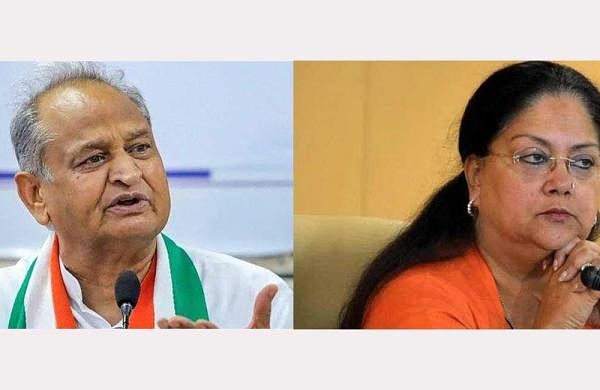Express News Service
JAIPUR: The November 25 voter count in the Rajasthan Assembly polls stood at 74.96% — nearly 1% higher than in the 2018 elections. The state is known as a “two-party state” where power has shifted between Congress and BJP for the last three decades. Analysts call the 1% increase in voting as substantial.
Discussions in political circles revolve around whether it will be ‘Raj or Rivaaj,’ which basically means whether the trend of changing governments will prevail or the impression of anti-incumbency will change.The key rivals are sitting pretty: While the BJP is happy with the vote percentage and claims it will ensure a strong win for it, the Congress is equally excited and claims the higher voting reflects a powerful undercurrent of support for the welfarism of the Gehlot government.
Data from previous elections shows that if the vote percentage increases by 3-4%, then BJP gets the advantage. But if the vote percentage decreases by 1%, Congress forms the government. The reason for the BJP’s happiness is that whenever an increase in voting is seen, the government has changed – and the party claims it is all set to return to power.
All elections held in the history of the state have been BJP-versus-Congress or between chief minister and ex-CM. However, this time the main contest is between Prime Minister Narendra Modi and Ashok Gehlot.Along with promises of development, polarization was a big issue in the 2023 elections. Both sides have made allegations over ‘appeasement politics’ and polarization attempts. Equally strong were the voices on the launch of the Ram temple in Ayodhya.
An increase in the voting percentage is noticed on the constituencies belonging to other big leaders. Observers say that either this took place to defeat them or make them win easily. The voting trends on the seats of state Congress chief Govind Singh Dotasara, Shanti Dhariwal and Ashok Chandna have been competitive. Last time there was Dotasara, who won despite the Modi wave. In the BJP too, there are concerns over leaders like leader of the Opposition Rajendra Rathod, Satish Poonia, Vasudev Devnani, and Narpat Singh Rajvi. Follow channel on WhatsApp
JAIPUR: The November 25 voter count in the Rajasthan Assembly polls stood at 74.96% — nearly 1% higher than in the 2018 elections. The state is known as a “two-party state” where power has shifted between Congress and BJP for the last three decades. Analysts call the 1% increase in voting as substantial.
Discussions in political circles revolve around whether it will be ‘Raj or Rivaaj,’ which basically means whether the trend of changing governments will prevail or the impression of anti-incumbency will change.
The key rivals are sitting pretty: While the BJP is happy with the vote percentage and claims it will ensure a strong win for it, the Congress is equally excited and claims the higher voting reflects a powerful undercurrent of support for the welfarism of the Gehlot government.
Data from previous elections shows that if the vote percentage increases by 3-4%, then BJP gets the advantage. But if the vote percentage decreases by 1%, Congress forms the government. The reason for the BJP’s happiness is that whenever an increase in voting is seen, the government has changed – and the party claims it is all set to return to power.googletag.cmd.push(function() {googletag.display(‘div-gpt-ad-8052921-2’); });
All elections held in the history of the state have been BJP-versus-Congress or between chief minister and ex-CM. However, this time the main contest is between Prime Minister Narendra Modi and Ashok Gehlot.
Along with promises of development, polarization was a big issue in the 2023 elections. Both sides have made allegations over ‘appeasement politics’ and polarization attempts. Equally strong were the voices on the launch of the Ram temple in Ayodhya.
An increase in the voting percentage is noticed on the constituencies belonging to other big leaders. Observers say that either this took place to defeat them or make them win easily. The voting trends on the seats of state Congress chief Govind Singh Dotasara, Shanti Dhariwal and Ashok Chandna have been competitive. Last time there was Dotasara, who won despite the Modi wave. In the BJP too, there are concerns over leaders like leader of the Opposition Rajendra Rathod, Satish Poonia, Vasudev Devnani, and Narpat Singh Rajvi. Follow channel on WhatsApp





